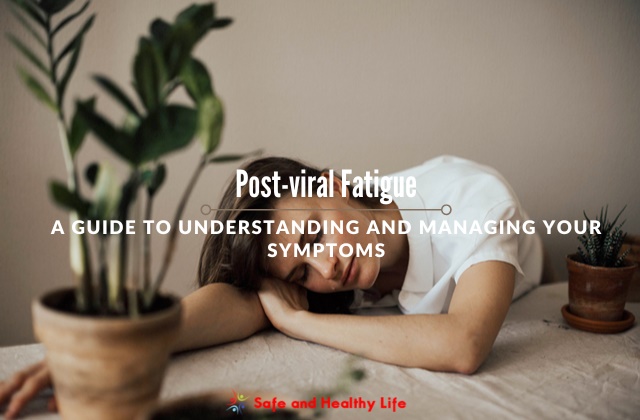Post-viral Fatigue: A Guide to Understanding and Managing your Symptoms

People are most likely to experience post-viral fatigue for a few weeks or months after combating an infection.
While some treatments and home remedies can cure fatigue and help patients regain their energy levels, sometimes its symptoms may last for a very long time.
In this article, we share with you the general overview of post-viral fatigue, including its causes and symptoms.
Further, we’ll explain the effective ways to manage this condition.
What is post-viral fatigue syndrome?
An individual is likely to experience post-viral syndrome after suffering from a virus. It may occur even after the common cold or flu.
When a virus is out of a person’s body, he/she is likely to feel drained of energy due to this condition. This feeling often lingers for many days to months even after a viral infection.
Any viral infection may trigger post-infectious fatigue, such as:
- Flu
- Common cold
- Herpes
- Pneumonia
- HIV
- Epstein-Barr virus
This syndrome is more apparent in individuals with a weak immune system. So, they need to get treatment as soon as possible to get rid of this condition.
Symptoms
Typically, the symptoms of post-viral fatigue vary from individual to individual.
However, many people state that they feel extremely fatigued and unwell during this condition. This feeling often persists no matter how long you sleep or how well they take care of your physical health.
The symptoms of post-viral syndrome may vary from person to person, but most people describe it.
Some additional symptoms caused by the post-viral syndrome are:
- Headaches
- Confusion
- Stiff joints
- Difficulty concentrating
- Pains and aches in the muscles
- Swollen lymph nodes
- Sore throat
In many cases, the body takes extra time to eradicate the virus from the system. However, if these symptoms linger for a longer duration, you need to talk to a doctor.
Treatment
Generally, some medication and home remedies, like proper sleep, can cure this condition. But if it’s taking longer to cure or no improvement is seen in a person, they need to consider joining a support group for managing the condition.
Management of post-viral syndrome
According to experts, here are certain activities that can manage your fatigue and get you back to normal activities:
Rest
Your body requires proper rest when recovering from a viral infection. You need to take short rests during the daytime even when your condition is improving. When you rest your body, your mind also calms down and you get stress-free.
Certain mindfulness strategies, breathing, and guided relaxation may help you properly rest.
Try finding various ways to make you relaxed until you find something that actually works for you.
Don’t overstress your mind or limit excessive ‘thinking’ activities
You need to reduce certain thinking activities, like decision-making, reading, using electronic devices, and stressing over your health. All these thinking tasks may take up your energy and you are likely to feel fatigued again.
So, take regular breaks for rest even if you don’t feel like relaxing. It may slowly improve your fatigued condition.
Gradually increase your activity levels
Generally, people try to pace up their activities too quickly. But increasing activity levels too fast can lead to setbacks.
It’s often suggested to improve both thinking and physical activities slowly. It is very helpful when you repeat your activity gradually to ensure you’re not fatigued too easily.
Follow an exercise routine
Exercise is another approach that you need to follow in a similar gradual manner. You must begin with gentle exercises, like short walks and stretches.
If you were quite active before a viral infection, you need to resume your exercise routine slowly. When you slowly increase your exercise pace and activities, you can find out how your body would adjust up or down to a certain activity.
If your exercise routine works well for you, it’s best to stick to that for regular improvement in fatigue.
Be gentle on yourself for a quick recovery
Often people are quite harsh on themselves when dealing with excessive fatigue.
So, they start self-criticism to push through tiredness for completing specific tasks. But it may make your symptoms worse.
Instead, you need to be gentle with yourself, understand your body’s way of recovering, and accept your fatigue.
This is how you can make positive changes to your body and mind for managing your symptoms.
Maintain a daily routine
With a daily routine for your sleeping, everyday activities, eating, and rest, you may slowly recover your system and return to the normal routine.
Making such changes can be hard but can be made possible with the help of the right daily routine.
Take care of your mental health
Typically, fatigue may impact various aspects of one’s life, including a frame of mind. You may feel frustrated, anxious, in a low mood, and guilty due to this condition.
Therefore, it’s better to take good care of your mental health. You can do so by talking to someone professional who can make you work on your mindfulness strategies.
Summary
Recovering from post-infectious fatigue can often drain your mind and body. Even after your body clears out the virus, certain symptoms, like fatigue, can linger for a longer period.
Therefore, it is best to first understand the post-viral syndrome and its causes. After that, you can work on the recovery and management of this condition and related troublesome symptoms.
If you are experiencing any of the above-mentioned symptoms for over a few weeks after your recovery, it’s best to see a healthcare provider for help.
A medical professional can guide you better and also help you manage the condition by following the activities given above.
References:
https://wchh.onlinelibrary.wiley.com/doi/10.1002/pnp.698
https://www.healthline.com/health/post-viral-fatigue#takeaway

